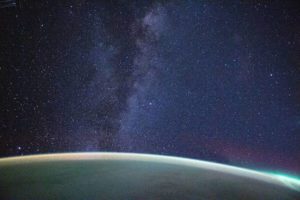By Curt Collier
I love a winter sky… far more interesting than the paltry display of summer. Sure, Scorpio looks great with its bright red eye (Antares) observed from a meadow in Yellowstone during August, but that is no comparison to the red eye (Aldebaran) of Taurus pitched between Orion and the Pleiades. I’m smitten. It’s not just the constellations that grace a winter sky. Perhaps due to the sudden drop in humidity, the sky comes alive in the winter. Each evening as I take our pet for her nightly patrol of the neighborhood, her eyes are drawn to the cavalcade of smells arising from a neighbor’s Ligustrum, while my eyes are drawn ever upward. It’s there I reorient myself to the world each evening. There’s Polaris in the north, Orion’s sword pointing south, and a parade of planets from east to west. (Look up to see Venus, Saturn, and Jupiter all in a row). There is, however, another reason I like a winter sky.

My father went to work each morning at 5, and he passed through my brother’s and my room on the way to his old Buick (our room was once a garage). In 1966, Victoria, Texas, was still a fairly sleepy town and on that cool November night, the thick humid haze had lifted, revealing more of the night sky. I remember being awakened from my sleep by my father, who was quickly wrapping us in our Navajo-print blankets. “Come outside quickly!” he said excitedly. “Meteors!” He ran through the house waking my siblings and mom and soon all of us were standing on the carport gazing upward. And what a sight! This was the great Leonid meteor shower of 1966, when meteors rained down 50 per second. It was awe-inspiring and a little scary. “I don’t understand.” I remember asking my dad, “What is going on?” Unless you’ve seen such a meteor “storm,” it’s difficult to describe. It was like standing under a clear umbrella as streaks of shimmering rain were flowing down on all sides at a high rate. Our planet had rotated into the direction of the bits of debris projected off the Tempel-Tuttle comet, and we were headed right into that stream. The vision is etched into my memory.
Such an astronomical spectacle
I’ve tried to explain it to others, but unless you’ve seen it, it is indeed hard to imagine. It’s not like most people have seen such an astronomical spectacle, and so they tell you some story about a meteorite they once saw streak across the lake where their family had gone camping. Cool, to be sure, but not the same thing. For example, I had the privilege of seeing a total solar eclipse a few years back and all I want to do is to see it again. There we all sat chatting in a field in Grand Teton when suddenly (it happens extremely fast) a whole punched into the sky and a bright ring appeared. We all began screaming and running east toward this splendor. It was the most beautiful thing I had ever seen…and I, too, was running, shouting, and wanting to embrace this wonder. Sometimes, it’s all I can think about. (Get ready, another is coming in 2025. Sell everything you have if you need to and reserve your spot in Pennsylvania or upstate New York). I have friends in Texas who saw a partial eclipse. They said it was kind of neat, also. Not even close to what we were experiencing, those of us lucky enough to be in the path of totality. It’s like comparing the glow off a lighted billboard along Highway 80 to seeing the aurora borealis.
OK, this might all sound a little too geeky (don’t care), but I think it’s important to know where you get your supply of wondrous moments. We need them in our lives, those instances with extraordinary beauty and surprise that remind us that life can be pretty amazing.
Hopefully, you carry them in your consciousness like a string of pearls, a collection of precious bobbles that adorn your essence.
Curiosity, contemplation, and joy
The psychologist Dr. Neel Burton explains that “Wonder is a complex emotion involving elements of surprise, curiosity, contemplation, and joy. It is perhaps best defined as a heightened state of consciousness and emotion brought about by something singularly beautiful, rare, or unexpected—that is, by a marvel.”
Dr. Burton argues that wonder renders our perception of the world and allows for new ideas and new thinking to take root in the gap. Thus, it’s not only a momentary experience of beauty or awe, but an opportunity to reexamine our world and perhaps expand that vista.
Perhaps that’s what happened to me in 1966 when I told my dad “I don’t understand” upon seeing the Leonid meteor shower. Somehow the starry sky was alive in ways I didn’t know were possible. I never looked at the night sky the same way and it deepened my love of science, which has opened me up to even more wonders.
And so, yes indeed, moments of wonder are necessary. What inspires you will surely be different than what inspires me, and I look forward to hearing your own stories of marvel. What a great way to pass the winter indoors, sharing these exquisite bobbles with our friends and watching their faces light up as our heart begins to race and our voice trembles a little as we recall the vision with excitement. Perhaps your world, too, was enlarged by these events. We need these moments to stretch our imagination. So I ask once again, where do you get your supply of wonder?
Curt Collier is interim leader of the Ethical Culture Society of Bergen County.
